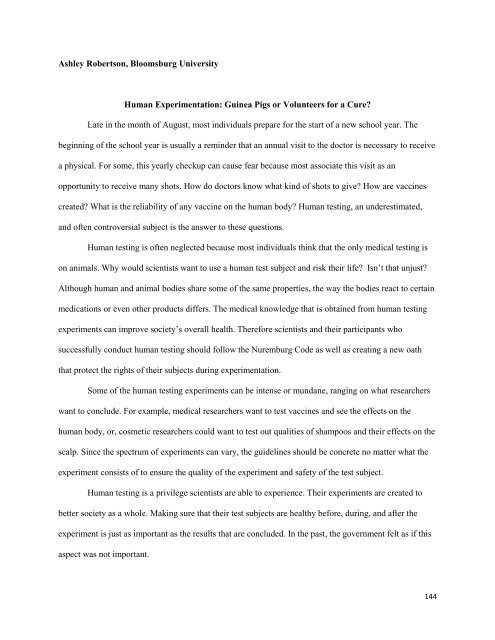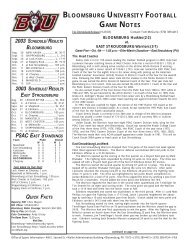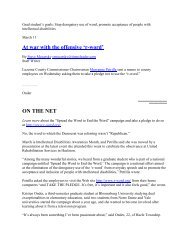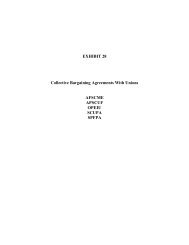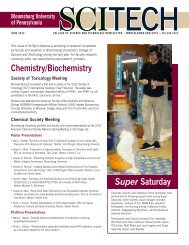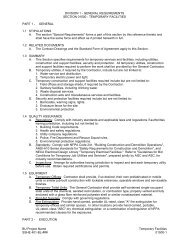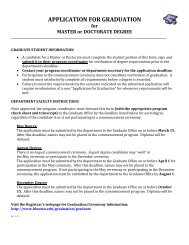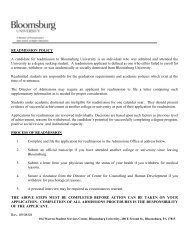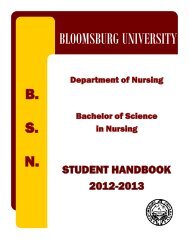Human Rights at Home and Abroad: Past, Present, and Future
Human Rights at Home and Abroad: Past, Present, and Future
Human Rights at Home and Abroad: Past, Present, and Future
You also want an ePaper? Increase the reach of your titles
YUMPU automatically turns print PDFs into web optimized ePapers that Google loves.
Ashley Robertson, Bloomsburg University<br />
<strong>Human</strong> Experiment<strong>at</strong>ion: Guinea Pigs or Volunteers for a Cure?<br />
L<strong>at</strong>e in the month of August, most individuals prepare for the start of a new school year. The<br />
beginning of the school year is usually a reminder th<strong>at</strong> an annual visit to the doctor is necessary to receive<br />
a physical. For some, this yearly checkup can cause fear because most associ<strong>at</strong>e this visit as an<br />
opportunity to receive many shots. How do doctors know wh<strong>at</strong> kind of shots to give? How are vaccines<br />
cre<strong>at</strong>ed? Wh<strong>at</strong> is the reliability of any vaccine on the human body? <strong>Human</strong> testing, an underestim<strong>at</strong>ed,<br />
<strong>and</strong> often controversial subject is the answer to these questions.<br />
<strong>Human</strong> testing is often neglected because most individuals think th<strong>at</strong> the only medical testing is<br />
on animals. Why would scientists want to use a human test subject <strong>and</strong> risk their life? Isn‘t th<strong>at</strong> unjust?<br />
Although human <strong>and</strong> animal bodies share some of the same properties, the way the bodies react to certain<br />
medic<strong>at</strong>ions or even other products differs. The medical knowledge th<strong>at</strong> is obtained from human testing<br />
experiments can improve society‘s overall health. Therefore scientists <strong>and</strong> their participants who<br />
successfully conduct human testing should follow the Nuremburg Code as well as cre<strong>at</strong>ing a new o<strong>at</strong>h<br />
th<strong>at</strong> protect the rights of their subjects during experiment<strong>at</strong>ion.<br />
Some of the human testing experiments can be intense or mundane, ranging on wh<strong>at</strong> researchers<br />
want to conclude. For example, medical researchers want to test vaccines <strong>and</strong> see the effects on the<br />
human body, or, cosmetic researchers could want to test out qualities of shampoos <strong>and</strong> their effects on the<br />
scalp. Since the spectrum of experiments can vary, the guidelines should be concrete no m<strong>at</strong>ter wh<strong>at</strong> the<br />
experiment consists of to ensure the quality of the experiment <strong>and</strong> safety of the test subject.<br />
<strong>Human</strong> testing is a privilege scientists are able to experience. Their experiments are cre<strong>at</strong>ed to<br />
better society as a whole. Making sure th<strong>at</strong> their test subjects are healthy before, during, <strong>and</strong> after the<br />
experiment is just as important as the results th<strong>at</strong> are concluded. In the past, the government felt as if this<br />
aspect was not important.<br />
144


